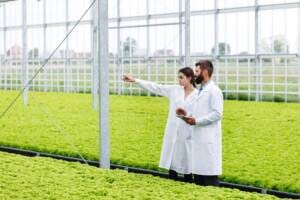
Sustainability in the food industry is one of the most important issues facing the global food sector today. With increasing environmental challenges such as climate change, resource scarcity, and increased pollution, there is an urgent need to shift towards more sustainable and environmentally friendly practices in this industry. The concept of sustainability aims to achieve a balance between meeting current human needs without affecting the ability of future generations to meet their needs.
In this article, we will discuss the importance of sustainability in the food industry, the challenges facing this industry, and the solutions that can be adopted to achieve true sustainability.
What is sustainability in the food industry?
Sustainability in the food industry is a concept that refers to following production and consumption practices that aim to reduce the environmental impact resulting from industrial activities, reduce the consumption of non-renewable natural resources, and preserve biodiversity. This sustainability includes several areas, including:
1- Food production: This includes improving water efficiency, reducing greenhouse gas emissions, and reducing the use of pesticides and harmful chemicals.
2- Packaging: It relies on the use of environmentally friendly packaging materials that are biodegradable or recyclable.
3-Energy: Shifting towards renewable energy sources such as solar and wind in manufacturing processes.
4-Waste: Reducing food waste and converting organic waste into useful resources such as compost or energy.
Challenges facing sustainability in the food industry
1-Scarcity of natural resources
The food industry faces major challenges in accessing natural resources such as water and agricultural land. Food production requires huge amounts of water, and with climate change and drought, these resources are becoming increasingly scarce, putting great pressure on producers to adopt more sustainable practices.
2-Carbon emissions
The food industry is one of the sectors that contributes significantly to greenhouse gas emissions. Whether through crop cultivation, meat production, or industrial processes, these emissions affect air quality and contribute to climate change. Shifting towards sustainability in the food industry requires reducing these emissions and adopting more efficient production techniques.
3-Food waste
It is estimated that about a third of the food produced worldwide is wasted before it reaches consumers. This waste not only affects the resources consumed in producing these foods, but also increases carbon emissions as these foods decompose in landfills.
Sustainable Solutions in the Food Industry
1-Transition to Organic Agriculture
Organic agriculture is one of the main solutions to enhance sustainability in the food industry. These practices rely on the use of organic and natural fertilizers, and reducing the use of chemical pesticides, which improves soil quality and preserves biodiversity.
2-Adopting sustainable manufacturing techniques
Modern technologies can play a major role in achieving sustainability. These technologies include the use of artificial intelligence and robotics to improve production efficiency and reduce waste. Water recycling techniques can also be adopted and energy consumption can be improved within factories.
3-Improving the supply chain
By improving the supply chain, waste can be reduced and food distribution efficiency improved. Technologies such as the Industrial Internet and the Internet of Things can be adopted to monitor storage and distribution processes, which reduces the possibility of spoilage and waste.
4-Sustainable packaging
Sustainable packaging is an important step towards sustainability in the food industry. Biodegradable or recyclable materials can be used to reduce the environmental impact of packaging. Smart packaging materials can also be developed to help maintain food freshness for longer, which reduces waste.
Economic Benefits of Sustainability in the Food Industry
Although implementing sustainability practices may require initial investment, the long-term economic benefits cannot be ignored. These benefits include:
Cost reduction: By reducing the use of resources such as water and energy, operating costs can be reduced.
Increased efficiency: Sustainable production techniques improve the efficiency of operations and reduce waste.
Meeting consumer demand: Consumers are becoming more aware of the importance of environmentally friendly products, increasing demand for sustainable products and enhancing customer loyalty.
Recycling and reusing resources
Recycling is an essential part of sustainability in the food industry. Companies can work to reduce waste by recycling materials used in production and packaging. For example, organic waste such as food scraps can be recycled and converted into compost or used to produce bioenergy. Additionally, manufacturing waste can be used as new raw materials in other processes, reducing the need to consume new resources. This process contributes to reducing environmental impact and saving operational costs.
Reducing the use of plastic
Plastic poses a major environmental problem, especially in the food industry where it is widely used in packaging. Shifting towards reducing the use of plastic or replacing it with environmentally friendly materials such as recycled paper or biodegradable plastic is an important step towards achieving sustainability in the food industry. Many companies today have started to move away from plastic packaging and look for sustainable alternatives, such as using reusable or refillable containers, which reduces environmental pollution and contributes to preserving the seas and oceans from plastic pollution.
Promoting the circular economy
The circular economy is an economic model that aims to reduce waste by reusing and recycling resources instead of disposing of them. In the context of sustainability in the food industry, this concept can be applied by reducing waste at all stages of production, from agriculture to consumption. For example, agricultural companies can use crop waste to produce other materials, such as using rice straw to make paper or feed. This system enhances sustainability and improves resource efficiency, which reduces environmental impact.
Empowering consumers to make sustainable decisions
Consumers play a major role in supporting sustainability in the food industry. By providing transparent and clear information about products, such as eco-labeling or clarifying the sources of ingredients, consumers can be empowered to make sustainable purchasing decisions. Increasing consumer awareness about the environmental impact of their food choices will contribute to increasing demand for environmentally friendly products, which will push companies to adopt more sustainable practices.
The role of consulting firms in promoting sustainability
Consulting firms play a pivotal role in helping food companies adopt sustainable practices. By providing specialized advice, these companies can help design effective strategies that reduce environmental impact and increase production efficiency.
With the major shifts towards sustainability in the food industry, ProNano Food Industry Consulting can provide comprehensive and integrated solutions for companies wishing to adopt sustainable practices. The company provides specialized consulting in improving production efficiency, reducing waste, and using sustainable manufacturing techniques. With its extensive experience in the food industry, ProNano helps companies achieve sustainability goals while maintaining their competitiveness in the market. For more information about the company’s services and to benefit from its consultations, you can contact the ProNano team via [Contact Information].
Read more about establishing a cake factory and smart packaging in the food industry



